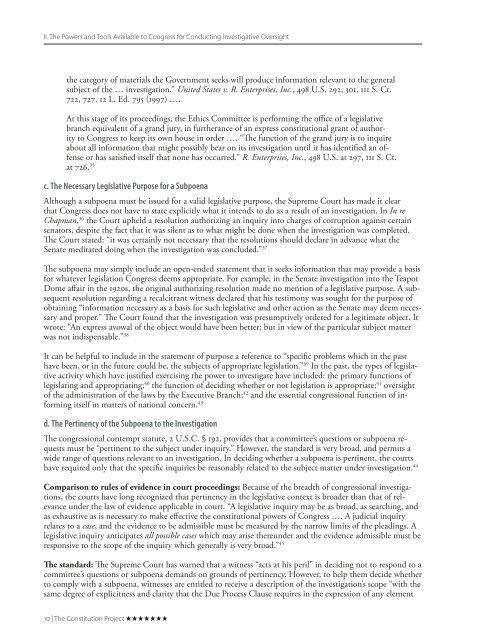When Congress Comes Calling
WhenCongressComesCalling
WhenCongressComesCalling
You also want an ePaper? Increase the reach of your titles
YUMPU automatically turns print PDFs into web optimized ePapers that Google loves.
II. The Powers and Tools Available to <strong>Congress</strong> for Conducting Investigative Oversight<br />
the category of materials the Government seeks will produce information relevant to the general<br />
subject of the … investigation.” United States v. R. Enterprises, Inc., 498 U.S. 292, 301, 111 S. Ct.<br />
722, 727, 12 L. Ed. 795 (1997) ….<br />
At this stage of its proceedings, the Ethics Committee is performing the office of a legislative<br />
branch equivalent of a grand jury, in furtherance of an express constitutional grant of authority<br />
to <strong>Congress</strong> to keep its own house in order …. “The function of the grand jury is to inquire<br />
about all information that might possibly bear on its investigation until it has identified an offense<br />
or has satisfied itself that none has occurred.” R. Enterprises, Inc., 498 U.S. at 297, 111 S. Ct.<br />
at 726. 35<br />
c. The Necessary Legislative Purpose for a Subpoena<br />
Although a subpoena must be issued for a valid legislative purpose, the Supreme Court has made it clear<br />
that <strong>Congress</strong> does not have to state explicitly what it intends to do as a result of an investigation. In In re<br />
Chapman, 36 the Court upheld a resolution authorizing an inquiry into charges of corruption against certain<br />
senators, despite the fact that it was silent as to what might be done when the investigation was completed.<br />
The Court stated: “it was certainly not necessary that the resolutions should declare in advance what the<br />
Senate meditated doing when the investigation was concluded.” 37<br />
The subpoena may simply include an open-ended statement that it seeks information that may provide a basis<br />
for whatever legislation <strong>Congress</strong> deems appropriate. For example, in the Senate investigation into the Teapot<br />
Dome affair in the 1920s, the original authorizing resolution made no mention of a legislative purpose. A subsequent<br />
resolution regarding a recalcitrant witness declared that his testimony was sought for the purpose of<br />
obtaining “information necessary as a basis for such legislative and other action as the Senate may deem necessary<br />
and proper.” The Court found that the investigation was presumptively ordered for a legitimate object. It<br />
wrote: “An express avowal of the object would have been better; but in view of the particular subject matter<br />
was not indispensable.” 38<br />
It can be helpful to include in the statement of purpose a reference to “specific problems which in the past<br />
have been, or in the future could be, the subjects of appropriate legislation.” 39 In the past, the types of legislative<br />
activity which have justified exercising the power to investigate have included: the primary functions of<br />
legislating and appropriating; 40 the function of deciding whether or not legislation is appropriate; 41 oversight<br />
of the administration of the laws by the Executive Branch; 42 and the essential congressional function of informing<br />
itself in matters of national concern. 43<br />
d. The Pertinency of the Subpoena to the Investigation<br />
The congressional contempt statute, 2 U.S.C. § 192, provides that a committee’s questions or subpoena requests<br />
must be “pertinent to the subject under inquiry.” However, the standard is very broad, and permits a<br />
wide range of questions relevant to an investigation. In deciding whether a subpoena is pertinent, the courts<br />
have required only that the specific inquiries be reasonably related to the subject matter under investigation. 44<br />
Comparison to rules of evidence in court proceedings: Because of the breadth of congressional investigations,<br />
the courts have long recognized that pertinency in the legislative context is broader than that of relevance<br />
under the law of evidence applicable in court. “A legislative inquiry may be as broad, as searching, and<br />
as exhaustive as is necessary to make effective the constitutional powers of <strong>Congress</strong> …. A judicial inquiry<br />
relates to a case, and the evidence to be admissible must be measured by the narrow limits of the pleadings. A<br />
legislative inquiry anticipates all possible cases which may arise thereunder and the evidence admissible must be<br />
responsive to the scope of the inquiry which generally is very broad.” 45<br />
The standard: The Supreme Court has warned that a witness “acts at his peril” in deciding not to respond to a<br />
committee’s questions or subpoena demands on grounds of pertinency. However, to help them decide whether<br />
to comply with a subpoena, witnesses are entitled to receive a description of the investigation’s scope “with the<br />
same degree of explicitness and clarity that the Due Process Clause requires in the expression of any element<br />
10 | The Constitution Project


